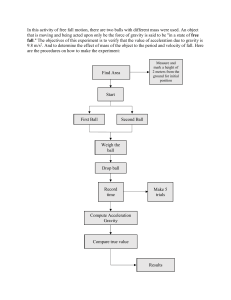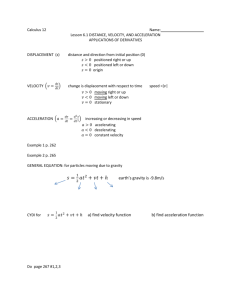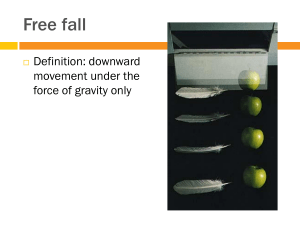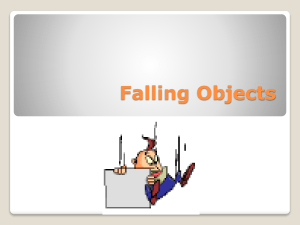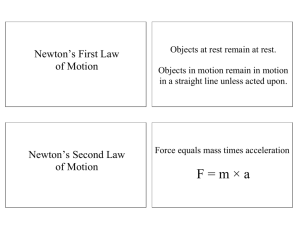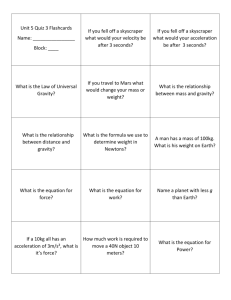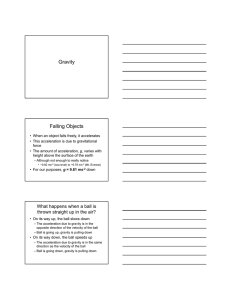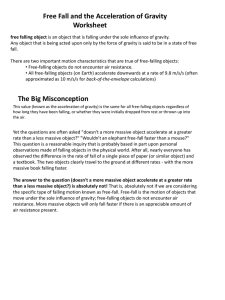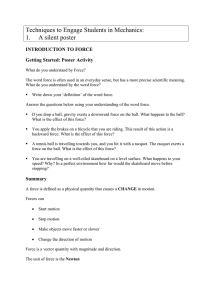Falling Objects
advertisement
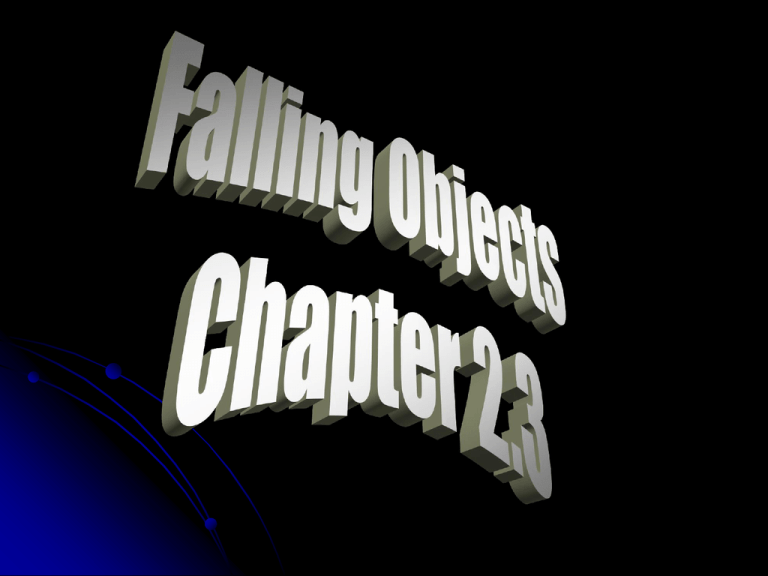
Gravity Free falling bodies undergo a constant acceleration. This constant downward acceleration is gravity. Earth’s gravity = (g) = - 9.81 m/s² 1 TON Gravity (cont.) When CRASH an object is moving at a downward (-) v velocity, it is moving in the direction of gravitational (-) g acceleration. More Gravity When an object is moving at an upward velocity, it (+) v is moving in the opposite direction of gravitational (-) g acceleration. Question What will fall faster when released at the same height and at the same time…………a text book or a pencil??? Even More Gravity The rate at which an object falls is independent of its mass. Sample Problem #1 A robot probe drops a camera off the rim of a 239 m high cliff on Mars where the free-fall acceleration is -3.70 m/s². a. b. What is the velocity of the camera when it hits the ground? How long does it take for the camera to hit the ground? a. Find vf ! a = -3.70 m/s² vi = 0.00 m/s vf² = vi² + 2aΔy vf² = 2aΔy vf = √2aΔy vf = √2(-3.70 m/s²)(-239 m) Δ y = - 239 m vf = 42.1 m/s down b. Find Δt ! a = -3.70 m/s² vi = 0.00 m/s vf = - 42.1 m/s Δ y = - 239 m Vf = Vi + a(Δt) Δt = Vf / a Δt = - 42.1 m/s / -3.70 m/s² Δt = 11.4 s Sample Problem #2 Jason hits a volleyball so that it moves with an initial velocity of 6.00 m/s straight upward. If the ball starts from 2.00 m above the floor, how long will it be in the air before it strikes the floor? Step 1: Find out how high the ball reaches. Vf ² = Vi ² + 2aΔy Δy = (Vf ²- Vi ²) 2a Vf = 0.00 m/s a = -9.81 m/s² Δy = -(6.00 m/s)² 2(-9.81 m/s²) Δy = -36.0 m²/s² -19.6 m/s² Δy= 1.84 m y tot= 1.84m + 2.00m = 3.84 Vi = 6.00 m/s 2.00 m m Step 2: Find out the time of the ball traveling up! Vf = 0.00 m/s Vf = Vi + a(Δt) Δt = (Vf – Vi) / a g = -9.81 m/s² Δt = – 6.00 m/s / -9.81 m/s² Vi = 6.00 m/s Δt up = 0.612 s Step 3: Find time traveling down. Δy = Vi (Δt) + ½(a)(Δt)² Vi = 0.00 m/s g = - 9.81 m/s² Δt = √(2Δy)/a Δy = -3.84 m Δt = √2( -3.84 m) /-9.81 m/s² 0.885 s = Δt down Step 4: Solve for the total time of ball before it hits the floor. Total time = Δt up + Δt down Total time = 0.612 s + 0.885 s Total time = 1.50 s
